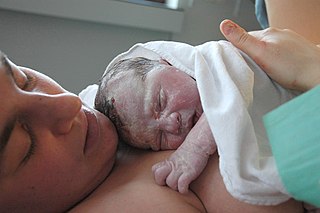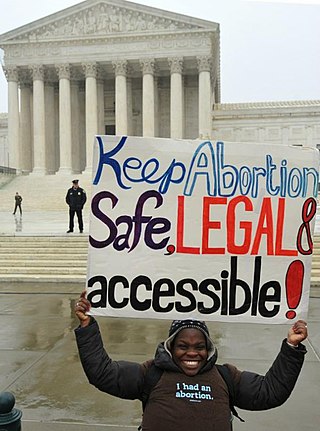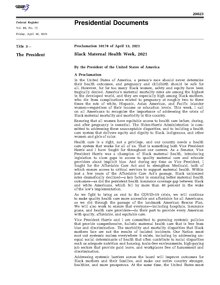
Childbirth, also known as labour, parturition and delivery, is the completion of pregnancy where one or more babies exits the internal environment of the mother via vaginal delivery or caesarean section. In 2019, there were about 140.11 million human births globally. In the developed countries, most deliveries occur in hospitals, while in the developing countries most are home births.

A doula is a trained professional who provides expert guidance for the service of others and who supports another person through a significant health-related experience, such as childbirth, miscarriage, induced abortion or stillbirth, as well as non-reproductive experiences such as dying. A doula might also provide support to the client's partner, family, and friends.

Teenage pregnancy, also known as adolescent pregnancy, is pregnancy in a female adolescent or young adult under the age of 20. Worldwide, pregnancy complications are the leading cause of death for women and girls 15 to 19 years old. The definition of teenage pregnancy includes those who are legally considered adults in their country. The WHO defines adolescence as the period between the ages of 10 and 19 years. Pregnancy can occur with sexual intercourse after the start of ovulation, which can happen before the first menstrual period (menarche). In healthy, well-nourished girls, the first period usually takes place between the ages of 12 and 13.
The maternal mortality ratio is a key performance indicator (KPI) for efforts to improve the health and safety of mothers before, during, and after childbirth per country worldwide. Often referred to as MMR, it is the annual number of female deaths per 100,000 live births from any cause related to or aggravated by pregnancy or its management. It is not to be confused with the maternal mortality rate, which is the number of maternal deaths in a given period per 100,000 women of reproductive age during the same time period. The statistics are gathered by WHO, UNICEF, UNFPA, World Bank Group, and the United Nations Population Division. The yearly report started in 1990 and is called Trends in Maternal Mortality. As of the 2015 data published in 2016, the countries that have seen an increase in the maternal mortality ratio since 1990 are the Bahamas, Georgia, Guyana, Jamaica, Dem. People’s Rep. Korea, Serbia, South Africa, St. Lucia, Suriname, Tonga, United States, Venezuela, RB Zimbabwe. But according to Sustainable Development Goals report 2018, the overall maternal mortality ratio has declined by 37 percent since 2002. Nearly 303,000 women died due to complications during pregnancy.

Maternal death or maternal mortality is defined in slightly different ways by several different health organizations. The World Health Organization (WHO) defines maternal death as the death of a pregnant mother due to complications related to pregnancy, underlying conditions worsened by the pregnancy or management of these conditions. This can occur either while she is pregnant or within six weeks of resolution of the pregnancy. The CDC definition of pregnancy-related deaths extends the period of consideration to include one year from the resolution of the pregnancy. Pregnancy associated death, as defined by the American College of Obstetricians and Gynecologists (ACOG), are all deaths occurring within one year of a pregnancy resolution. Identification of pregnancy associated deaths is important for deciding whether or not the pregnancy was a direct or indirect contributing cause of the death.
Women's health differs from that of men's health in many unique ways. Women's health is an example of population health, where health is defined by the World Health Organization (WHO) as "a state of complete physical, mental and social well-being and not merely the absence of disease or infirmity". Often treated as simply women's reproductive health, many groups argue for a broader definition pertaining to the overall health of women, better expressed as "The health of women". These differences are further exacerbated in developing countries where women, whose health includes both their risks and experiences, are further disadvantaged.
Reproductive rights are legal rights and freedoms relating to reproduction and reproductive health that vary amongst countries around the world. The World Health Organization defines reproductive rights as follows:
Reproductive rights rest on the recognition of the basic right of all couples and individuals to decide freely and responsibly the number, spacing and timing of their children and to have the information and means to do so, and the right to attain the highest standard of sexual and reproductive health. They also include the right of all to make decisions concerning reproduction free of discrimination, coercion and violence.

Sexual and reproductive health (SRH) is a field of research, health care, and social activism that explores the health of an individual's reproductive system and sexual well-being during all stages of their life. Sexual and reproductive health is more commonly defined as sexual and reproductive health and rights, to encompass individual agency to make choices about their sexual and reproductive lives.
Maternal health is the health of women during pregnancy, childbirth, and the postpartum period. In most cases, maternal health encompasses the health care dimensions of family planning, preconception, prenatal, and postnatal care in order to ensure a positive and fulfilling experience. In other cases, maternal health can reduce maternal morbidity and mortality. Maternal health revolves around the health and wellness of pregnant women, particularly when they are pregnant, at the time they give birth, and during child-raising. WHO has indicated that even though motherhood has been considered as a fulfilling natural experience that is emotional to the mother, a high percentage of women develop health problems and sometimes even die. Because of this, there is a need to invest in the health of women. The investment can be achieved in different ways, among the main ones being subsidizing the healthcare cost, education on maternal health, encouraging effective family planning, and ensuring progressive check up on the health of women with children. Maternal morbidity and mortality particularly affects women of color and women living in low and lower-middle income countries.

Reproductive justice is a critical feminist framework that was invented as a response to United States reproductive politics. The three core values of reproductive justice are the right to have a child, the right to not have a child, and the right to parent a child or children in safe and healthy environments. The framework moves women's reproductive rights past a legal and political debate to incorporate the economic, social, and health factors that impact women's reproductive choices and decision-making ability.
Unintended pregnancies are pregnancies that are mistimed, unplanned or unwanted at the time of conception.

Uganda, like many developing countries, has high maternal mortality ratio at 153 per 100,000 live births.According to the World Health Organization (WHO), a maternal death is the death of a woman while pregnant or within 42 days of termination of pregnancy, irrespective of the duration and site of the pregnancy, from any cause related to or aggravated by the pregnancy or its management but not from accidental or incidental causes. In situations where attribution of the cause of death is inadequate, another definition, pregnancy-related death was coined by the US Centers for Disease Control (CDC), defined as the death of a woman while pregnant or within 42 days of termination of pregnancy, irrespective of the cause of death.
Women's reproductive health in the United States refers to the set of physical, mental, and social issues related to the health of women in the United States. It includes the rights of women in the United States to adequate sexual health, available contraception methods, and treatment for sexually transmitted diseases. The prevalence of women's health issues in American culture is inspired by second-wave feminism in the United States. As a result of this movement, women of the United States began to question the largely male-dominated health care system and demanded a right to information on issues regarding their physiology and anatomy. The U.S. government has made significant strides to propose solutions, like creating the Women's Health Initiative through the Office of Research on Women's Health in 1991. However, many issues still exist related to the accessibility of reproductive healthcare as well as the stigma and controversy attached to sexual health, contraception, and sexually transmitted diseases.

Maternal mortality refers to the death of a woman during her pregnancy or up to a year after her pregnancy has terminated; this metric only includes causes related to the pregnancy, and does not include accidental causes. Some sources will define maternal mortality as the death of a woman up to 42 days after the pregnancy has ended, instead of one year. In 1986, the CDC began tracking pregnancy-related deaths to gather information and determine what was causing these deaths by creating the Pregnancy-Related Mortality Surveillance System. According to a 2010-2011 report although the United States was spending more on healthcare than any other country in the world, more than two women died during childbirth every day, making maternal mortality in the United States the highest when compared to 49 other countries in the developed world.
Abuse during childbirth is generally defined as interactions or conditions deemed humiliating or undignified by local consensus and interactions or conditions experienced as or intended to be humiliating or undignifying. Bowser and Hill's 2010 landscape analysis defined seven categories of abusive or disrespectful care, including physical abuse, non-consented clinical care, non-confidential care, non-dignified care, discrimination, abandonment, and detention in health facilities.
Monica Simpson is a queer Black activist, artist, and executive director of SisterSong Women of Color Reproductive Justice Collective, the United States' largest organization dedicated to reproductive justice for women of color.
The SisterSong Women of Color Reproductive Justice Collective, also known as SisterSong, is a national activist organization dedicated to reproductive justice for women of color.
Grace Kodindo is a Chadian obstetrician who has championed improvements to reproductive healthcare, not only in Chad but in poor countries throughout the world. She has been profiled in two BBC documentaries: Dead Mums Don't Cry (2005), charting her efforts to reduce the mortality rate of pregnant and childbearing women, and Grace Under Fire (2009), reporting on her involvement in a reproductive healthcare programme in the Democratic Republic of Congo.
Black maternal mortality in the United States refers to the death of women, specifically those who identify as Black or African American, during or after child delivery. In general, maternal death can be due to a myriad of factors, such as the nature of the pregnancy or the delivery itself, but is not associated with unintentional or secondary causes. In the United States, around 700 women die from pregnancy-related illnesses or complications per year. This number does not include the approximately 50,000 women who experience life-threatening complications during childbirth, resulting in lifelong disabilities and complications. However, there are stark differences in maternal mortality rates for Black American women versus Indigenous American, Alaska Native, and White American women.
Chaniece Wallace, a black woman and physician, died at 30 years of age from complications of pregnancy two days after the birth of her daughter. Her death is seen as preventable and is viewed in the context of high rates of maternal mortality in the United States, particularly among the African American population. It is cited as an example in medical and scholarly publications to call for improved health outcomes in the black U.S. population. Wallace died despite several factors seen as protective: she was "highly educated, employed as a health care practitioner, had access to health care, and had a supportive family." Wallace was a fourth year pediatric chief resident at the Indiana University School of Medicine and was working at Riley Children's Health Hospital at the time of her death.









